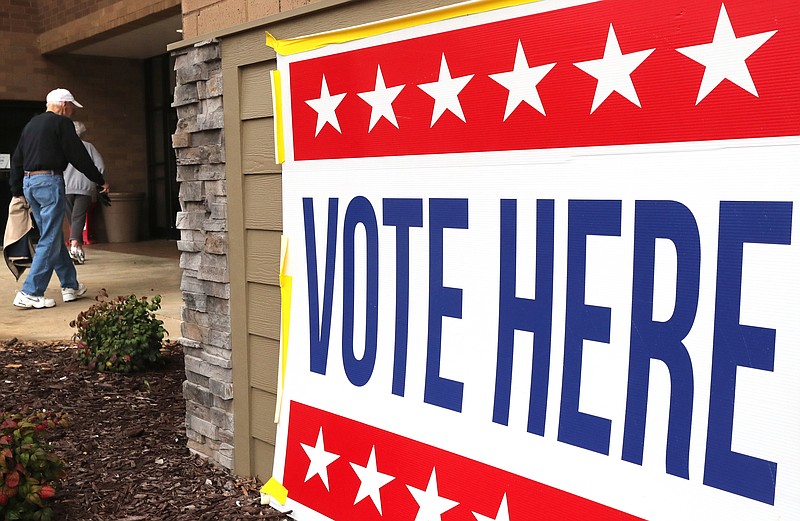Changing the state election code can have unintended consequences, as Garland County learned during the May 2014 preferential primaries and nonpartisan general election.
A 2013 law requiring election results to be reported by precinct, rather than polling location, eliminated the use of paper ballots, as the number of ballot styles required to satisfy the reporting mandate exceeded the capacity of memory cards the county used to transfer paper-ballot results to the secretary of state's office. Without the use of paper ballots, the county had to rely exclusively on its balky and inadequate supply of electronic voting machines.
Long lines resulted, discouraging many voters from casting ballots. It was the consensus of the 2013-14 Garland County Election Commission that more detailed reporting served the narrow purpose of helping political parties and candidates better allocate campaign resources, giving them a more defined breakdown of voter patterns than when results were reported by polling place.
"Our old scanners would only do 10 precincts," Election Commission Chairman Gene Haley, who was a poll worker in 2014, said last week. "We couldn't do it. They don't think these things through."
The voting system the county transitioned to in 2016 can satisfy the more detailed reporting requirement, but Haley said legislation filed during the 93rd General Assembly that convened last month would make it more difficult to administer elections. He cited Senate Bill 188, which would limit restrictions on electioneering at polling places.
The bill would only allow polling places to restrict the displaying of campaign signs, distributing of campaign materials and other campaigning within 100 feet of the polling place's entrance. Polling places, whether on public or private property, couldn't prohibit electioneering beyond the 100-foot perimeter.
The election commission said the bill, as it's currently written, has the potential to remove as many as half of the roughly two-dozen vote centers the county uses on Election Day. The small amount of rent the county pays provides little incentive for property owners, particularly when weighed against the inconvenience of hosting a polling site.
Several owners, citing traffic, litter and property damage, have removed their properties from the county's list of polling locations in recent elections.
"It's hard enough to find polling locations," Haley told the commission Wednesday. "If it's my property, and the Legislature says I have to do this, I'm going to say I don't want to be a polling place."
The commission said a Hot Spring County church's refusal to allow campaign signs on its property last year was a motivation for the bill. Haley said some of the sites Garland County uses as vote centers and early voting sites don't allow signs on their property either.
"The (Hot Springs Mall) is a good example," he said. "They didn't want signs up in their parking lot. You could do it all you wanted to out by the street. It would probably eliminate all of Hot Springs Village. They have limits as to what you can do with signage inside the Village, even on private property."
Haley expressed his concerns to the bill's sponsor, Sen. Alan Clark, R-District 13, of Lonsdale. In an email Clark sent Haley to solicit input on the bill, he said the election code needs to address the possibility of polling sites picking and choosing which candidates can display signs.
The county doesn't allow campaigning on the Election Commission Building property, which is usually the county's busiest early and Election Day voting location. Haley said the bill would limit the county's enforcement of the prohibition to within 100 feet of the building's entrance.
The same limitation would apply to the county courthouse. Haley said it's considered a polling site because it's where the county counts absentee ballots.
Haley said he supports other election-related legislation, including House Bill 1112. It would eliminate the option voters have of signing a sworn statement to verify their identity. Voters can sign the affidavit instead of presenting a photo ID at their polling place or providing a copy of their ID when returning their absentee ballot through the mail.
"Right now with voter ID, if somebody doesn't have an ID it becomes a provisional ballot at a polling location," Haley said. "They can sign an affidavit swearing who they are. And if that's the only reason it's a provisional, we have to count it. It's the same thing with an absentee ballot."
Voters who don't present ID would have until noon on the Monday following an election to prove their identity to the election commission or county clerk. Haley suggested including an electronic verification option, allowing voters to email a copy of their ID to election officials.
Haley said he's in favor of House Joint Resolution 1002, a proposed amendment to the state Constitution removing school millages from ballots unless the school district is asking voters for a rate increase. The Constitution requires districts to put their tax rates on the ballot during annual school elections, even if no rate increase is being proposed. The tax is levied no matter if voters approve or reject it.
Haley has said the arcane provision went mostly unnoticed before school districts began holding their annual school elections during party primaries. Higher turnout made it more noticeable, causing confusion for voters who don't normally participate in school elections.
"It's very confusing to people," Haley told the commission last week. "They vote no, and it doesn't make any difference."
